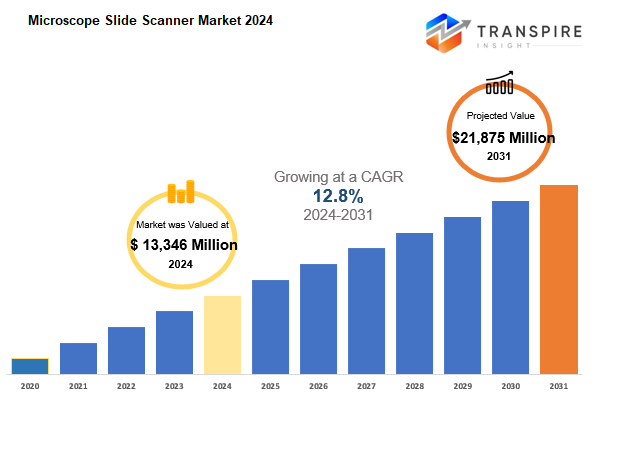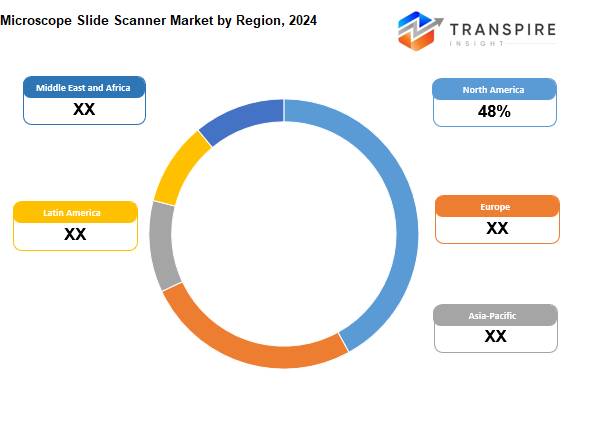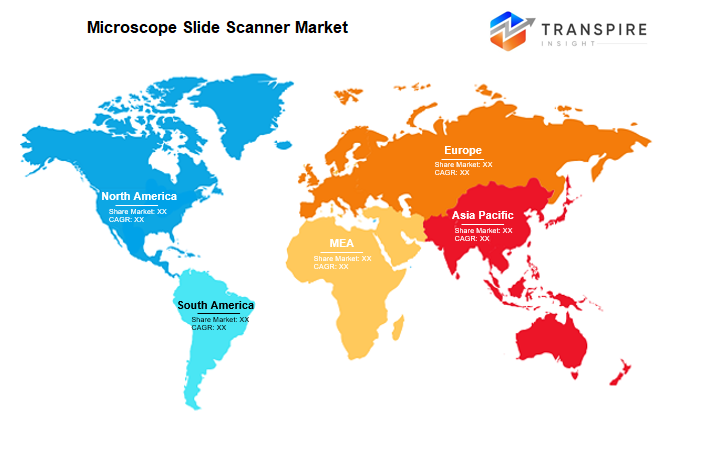Global Microscope Slide Scanner market is estimated to reach $21,875 Million by 2031; growing at a CAGR of 12.8% from 2024 to 2031.
The Global Microscope Slide Scanner market is experiencing significant growth within the modern medical and research industry. The shift towards high-quality digital imaging and analysis is driving the demand for digital scanners that can convert traditional glass slides into digital formats for easier storage, sharing, and analysis of specimen images. This transition from analog to digital formats represents a radical change in the way pathologists and researchers handle, examine, and share data within their disciplines, offering improved efficiency, precision, and data management capabilities globally.
This evolution towards digital microscopy not only enhances laboratories' efficiency and precision but also paves the way for personalized medicine to become a reality. By digitizing whole slides into high-resolution digital formats, researchers and medical professionals can access and analyze data more readily, facilitating remote consultations, collaborations, and improved diagnoses and treatments. The integration of advanced features such as automated slide loading, real-time image processing, and artificial intelligence algorithms will further streamline workflow, increase productivity, and lead to more accurate and consistent results, driving scientific discovery and improved health outcomes worldwide.

GROWTH FACTORS
The Global Microscope Slide Scanner market is poised for significant growth in the coming years, driven by the increasing demand for digital pathology. This shift towards digital solutions aims to enhance diagnostic accuracy and workflow efficiency in healthcare institutions and laboratories. By integrating advanced slide scanning technologies, pathologists will be able to analyze and interpret pathological samples more effectively, leading to quicker diagnoses and improved patient care. Furthermore, the adoption of microscope slide scanners in medical research and educational settings will provide detailed analyses of slides, enabling researchers and students to study biological structures and processes with greater precision. This advancement will not only enhance the learning experience but also foster innovation and knowledge sharing within the scientific community through the exchange of high-quality digital slide images.
However, despite the promising outlook, certain challenges may hinder the growth of the Global Microscope Slide Scanner market. High initial and maintenance costs associated with these devices could deter some institutions from investing in this technology. Budget constraints, particularly in small laboratories and educational institutions, may slow down the adoption rate of slide scanners. Additionally, the limited compatibility of some scanners with various slide types and staining techniques poses a challenge that needs to be addressed for wider acceptance. Nevertheless, technological advancements in imaging and the integration of artificial intelligence present lucrative opportunities for the market. By leveraging AI capabilities for slide analysis, microscope slide scanners can offer more detailed examinations with improved accuracy and speed, leading to enhanced disease detection and diagnosis. This innovation is expected to drive the development of advanced and cost-effective solutions, expanding the market reach and catering to a broader user base within the industry. Collaboration between technology developers and healthcare providers will be crucial in overcoming these challenges and enhancing the functionality of slide scanning devices. As research and development efforts continue to focus on AI-driven imaging solutions, new possibilities for personalized medicine and telepathology applications will emerge, further fueling the growth of the Global Microscope Slide Scanner market. Ultimately, the market's expansion will be driven by the increasing demand for sophisticated diagnostic tools and technological innovation, ensuring that healthcare and research sectors have access to efficient and accurate solutions for slide analysis. The continuous pursuit of innovation and collaboration will be key in maintaining the market's responsiveness to the evolving needs of its users.

MARKET SEGMENTATION
By Type
With the rise in demand for accurate diagnostic devices and advancements in technology, the Global Microscope Slide Scanner market is expected to experience significant growth. The market will be divided into portable microscope slide scanners and desktop microscope slide scanners, each catering to specific industry needs. Portable scanners will offer mobility and ease of use for professionals working in various environments, while desktop scanners will provide higher quality images and increased throughput for laboratories and research centers.
Artificial intelligence and machine learning are anticipated to further drive the growth of the Global Microscope Slide Scanner market. AI-powered scanners will automate image analysis, enhance diagnostic accuracy, and improve workflow efficiency. Additionally, the increasing demand for telepathology solutions will lead to greater collaboration among medical professionals worldwide, ultimately benefiting patient care and outcomes. As technology continues to evolve and integrate with medicine, the market for microscope slide scanners will play a crucial role in shaping the future of healthcare and scientific research.
By Application
The Global Microscope Slide Scanner market is currently experiencing a significant transformation driven by the rapid advancements in technology and the increasing demand from various applications. The future of this market looks promising with the introduction of innovative solutions that enhance the efficiency of research and diagnostic processes. Microscope slide scanners, designed specifically for digital pathology, are set to play a crucial role in biological research, medicine, veterinary applications, and other related fields. By converting physical slides into high-resolution digital images, these devices streamline data analysis, storage, and sharing, facilitating improved productivity and collaboration among health researchers and professionals.
In the realm of biological research, microscope slide scanners offer scientists valuable tools for analyzing and documenting specimens with automation and precision. These devices enable in-depth research studies across a wide range of areas, leading to accelerated discovery and innovation in complex biological systems. As technology progresses, the integration of artificial intelligence in advanced scanners will enable automatic image analysis and pattern recognition, freeing researchers from the laborious task of manual slide examination. The adoption of microscope slide scanners in the medical field is expected to surge, enhancing diagnostic accuracy and enabling quicker turnaround of results. With the incorporation of machine learning algorithms, these devices will identify subtle patterns that may be missed by the human eye, paving the way for remote diagnostics and increased access to quality healthcare worldwide.
REGIONAL ANALYSIS
The Global Microscope Slide Scanner market is currently experiencing rapid growth across different regions, with each region contributing uniquely to its expansion. In North America, the market is dominated by the United States, Canada, and Mexico, thanks to their advanced health infrastructure and strong research and development capabilities. The presence of numerous biotechnology firms and research institutions in the region is expected to drive further demand for microscope slide scanners, making North America a key market leader. In Europe, countries like the UK, Germany, France, and Italy are at the forefront due to their well-established healthcare systems and growing focus on precision medicine. The increasing adoption of digital pathology in the region will further fuel demand for high-end microscope slide scanners.
Moving to the Asia-Pacific region, emerging markets like India, China, Japan, and South Korea are witnessing rapid growth in the demand for microscope slide scanners due to the rising prevalence of chronic diseases and the development of healthcare infrastructure. In South America, countries like Brazil and Argentina are experiencing slow but steady growth in the acceptance of microscope slide scanners, driven by a growing healthcare sector and increasing awareness about advanced diagnostic techniques. The Middle East & Africa region also presents growth opportunities, with countries like the GCC nations, Egypt, and South Africa investing in advanced medical technologies to improve healthcare outcomes. Overall, the Global Microscope Slide Scanner market is poised for significant expansion across all regions, driven by technological advancements and increasing demand for advanced diagnostic tools.

KEY INDUSTRY PLAYERS
The Global Microscope Slide Scanner market is experiencing significant developments and a steady growth trajectory due to its vital role in enhancing diagnostic accuracy and research efficiency. As technology advances, the demand for more advanced scanning devices is expected to rise to meet the growing need for improved healthcare services and research methodologies. Microscope slide scanners have become essential tools for hospitals, research centers, and educational institutions, enabling rapid and precise examination of specimens. The shift towards digital and automated processes in the industry is expected to drive further momentum, leading to more reliable and efficient results.
Leading players in the Global Microscope Slide Scanner market are at the forefront of innovation, focusing on enhancing the functionality and capabilities of these devices. Companies like Feinoptic, Zeiss Microscopy, Roche, and Biocompare are investing heavily in research and development to improve imaging quality, user interface, and introduce new features that will expand the applications of slide scanners in various sectors such as medical diagnostics, pathology, and academic research. The market's competitive landscape is characterized by continuous innovation, strategic partnerships, and the pursuit of new technologies to gain market share and offer customized solutions that cater to the diverse needs of users. Integration of Artificial Intelligence and Machine Learning by companies like Olympus Microscopy Europa and Electron Microscopy Sciences is expected to revolutionize the functionality of microscope slide scanners, making data analysis more precise and efficient, thereby driving market growth and adoption across various industries.
The future of the Global Microscope Slide Scanner market will be shaped by ongoing technological advancements, strategic alliances among key players, and a focus on pushing the boundaries of what these devices can achieve. Companies like HEKA, Applied Spectral Imaging, and Amos Scientific are expected to lead the way in innovating new products that address current challenges and anticipate future requirements. With continued investments in research and development, the market is poised for continuous growth and transformation, setting new standards in quality, performance, and applications within the industry.
REPORT SCOPE AND SEGMENTATION
|
Attributes |
Details |
|
Market Size By 2031 |
USD 21,875 Million |
|
Growth Rate |
CAGR of 12.8% |
|
Forecast period |
2024 - 2031 |
|
Report Pages |
250+ |
|
By Type |
|
|
By Application |
|
|
By Region |
|
|
Key Market Players |
|













 APAC:+91 7666513636
APAC:+91 7666513636





